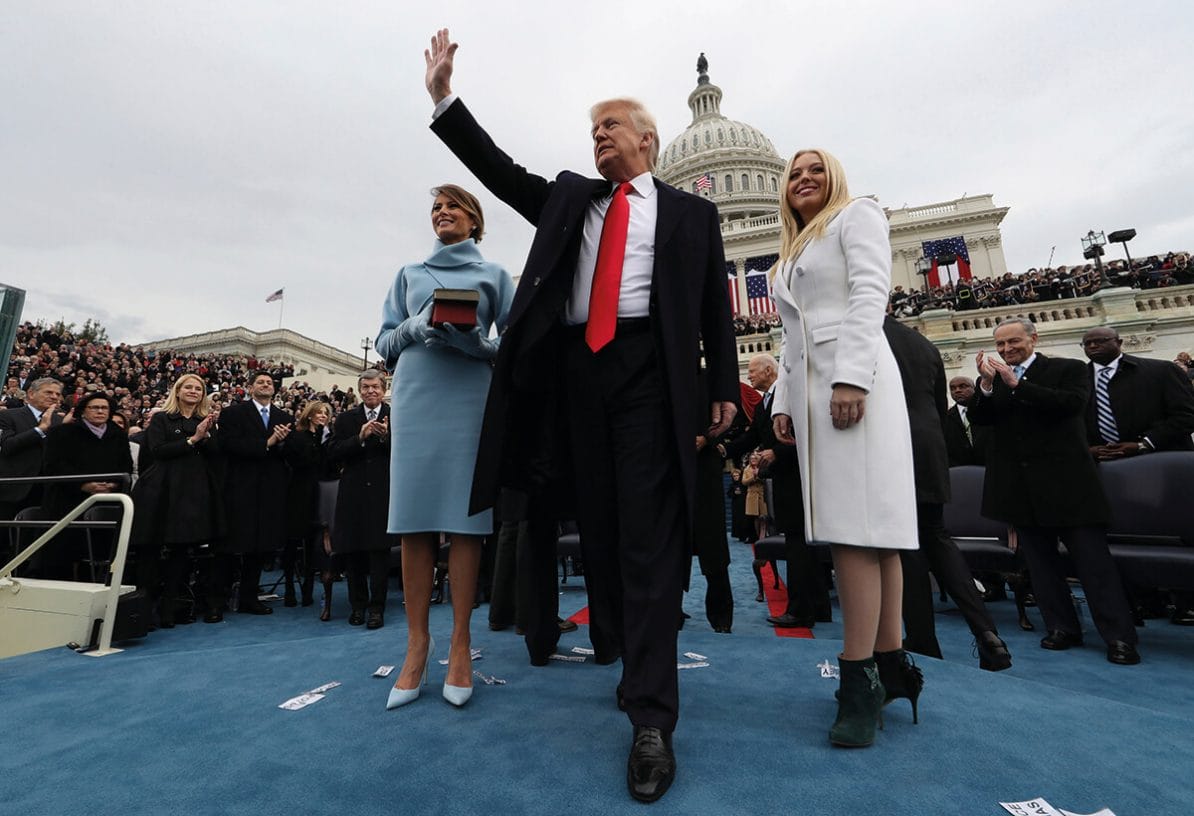Moment that mattered: The inauguration of Donald Trump
On 20th January 2017, Donald Trump was inaugurated as president of the United States. In issue #26 of Delayed Gratification we spoke to Dan Carlin, creator and host of the 'Common Sense' podcast, about the president's first day in power – and what happened next

Donald Trump, his wife Melania and his daughter Tiffany greet crowds by the Capitol Building in Washington DC. Photo: USA TODAY NETWORK
20th January 2017 (Taken from: #26)
Dan Carlin felt conflicted on inauguration day. The host of the highly influential Common Sense podcast has lobbied throughout his career for an “outsider” president – one who is not part of the political establishment – to challenge the orthodoxies of the US system. And now his wish had been granted. In the form of Donald J Trump.
“All outsiders are not created equal. And I think that the election of Donald Trump is a worst case scenario for those people who had for so long been hoping an outsider would come and help, because I don’t know how many people are going to be willing to try this again,” he says. “Like a lot of Americans on inauguration day, I felt worried. But unlike a lot of Americans, I felt specifically worried for my own point of view because I thought, this guy’s going to discredit the idea of having outsiders coming into the political system for the rest of my lifetime.”
Carlin is a former TV news reporter who has carved out a huge and loyal following across the political spectrum by offering a non-partisan analysis of current events, and bringing deep historical context to modern debates. His desire for an outsider president is based on a wish to bring transparency and accountability to the presidency, to break the “fourth wall” and shine some light on the unquestioned assumptions of the status quo.
Trump’s inauguration speech suggested that this status quo was unacceptable. It was described by many media outlets at the time as painting a grim, almost apocalyptic vision of a broken nation. The New York Times described it as an “angry jeremiad” and The Wall Street Journal called it “short, dark and defiant”. The Washington Post wrote that “it stood out from the 57 prior [inaugural speeches] in one way: It was bleaker. A lot bleaker.” The paper analysed the text of the speech and determined that the president used 44 terms which had never been used in an inaugural speech in US history. The terms included “trapped”, “stealing”, “bleed” and “robbed”.
In a key section, the 45th president conjured up a vision of “rusted-out factories scattered like tombstones across the landscape of our nation; an education system, flush with cash, but which leaves our young and beautiful students deprived of all knowledge; and the crime and the gangs and the drugs that have stolen too many lives and robbed our country of so much unrealised potential”. The passage ended with a vow: “This American carnage stops right here and stops right now.”
Carlin doesn’t take issue with the idea of American carnage. “There’s some hyperbole there, but I think while those themes might sound, for lack of a better word, Trumpy, I think they resonate with the American people,” he says. “If, for example, you wanted to say that we have carnage in some of the big cities in this country with the murder rate, I think that’s perhaps something that you can legitimately say.”
Another key theme in the speech was the idea of ‘America First’: Trump promised to stop “other countries making our products, stealing our companies and destroying our jobs”. For Carlin, this idea was one of the key reasons for Trump’s triumph in the election. “I think you could tie a lot of this ‘American carnage’ idea to the loss of good middle-class jobs,” he says. “There has been a sense for a long time that there’s been a hollowing out of our economy. Those jobs that create what you could call an American electoral ballast have been disappearing. The time was definitely right to start enunciating those kinds of themes.”
The day after the speech, President Trump’s press secretary, Sean Spicer, gave a combative White House briefing in which he attacked reports that the crowd that turned out was much smaller than that for President Obama’s two inaugurations. “This was the largest audience ever to witness an inauguration, period,” he said.
Carlin sees this aggressive insistence on having had the biggest crowd – in the face of aerial photos which seems to disprove the claim – as “just one episode in a long line of similar things from Trump. But it’s exactly the kind of thing that made it impossible for me to embrace this guy even though he was this outsider candidate that I’d been asking for for years, because I think there’s something obviously psychologically off with him. It’s as though somehow, were the claim about the crowd to be definitively proven wrong, something inside the guy would collapse.”
Looking back on Trump’s first months in power, Carlin sees little of the transformation promised in the inaugural speech. “I was always going to find it interesting to see how an outsider candidate walked into the inertia of Washington and tried to turn the big ship around, how the system responded to this foreign body,” he says. “I would say that it seems to have done a pretty standard job of co-opting him so far. He might be a rogue tweeter but by and large when you look at, for example, how foreign policy is shaping up in East Asia or the Middle East right now, it’s pretty much the status quo.”
But maybe Trump is just getting started. Maybe he’ll take the fight to what he sees as the vested interests, transferring power from Washington, DC and giving it back to the American people as he promised on 20th January. Carlin has his doubts. “If you look at the most success that Trump had in the campaign, I would suggest that promising to ‘drain the swamp’ was it,” says Carlin. “Washington only hears the campaign contributors and if regular Americans are not the campaign contributors, you can draw your own conclusion about what that means. Trump walked in and made a big fanfare about saying, ‘We’re not going to have a revolving door with lobbyists in this administration,’ and already behind the scenes there are exemptions and loopholes being created for those with influence that the average Joe or Jane in this country will never hear about. I don’t pay much attention to his rhetoric on this.”
Carlin is not hopeful that his long-awaited outsider president will ever come in and really shake things up. “It’s stunning how remarkably consistent the system is at producing leadership that’s not good enough for the problems we face,” he says. “I think we’ve been in a position for a long time where you could argue that we’ve been able to get by okay on autopilot. The big tests will come when we can’t do that any more.”
Slow Journalism in your inbox, plus infographics, offers and more: sign up for the free DG newsletter. Sign me up
Thanks for signing up.








